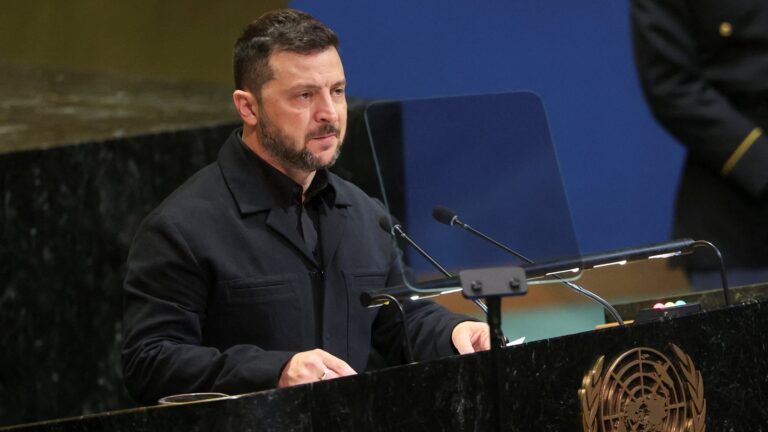Explaining Ukraine’s strategy of targeting Russian oil after another refinery hit
Ukraine has struck another oil refinery in Russia today, according to a local official.
Radiy Khabirov, head of the Republic of Bashkortostan (part of the Russian Federation), said on Telegram that the Neftekhim Salavat plant had been hit.
But it’s not the first time the refinery and others have been targeted – so why is Ukraine pursuing this strategy?
‘We had no choice’
Partly, Ukraine is attacking this way out of necessity, its leaders would argue.
When Ukrainian President Zelenskyy spoke to the UN General Assembly today, he said Ukraine didn’t have “big fat missiles”.
But he added: “We do have drones that can fly up 2,000-3,000km.
“We had no choice but to build them to protect our right to live.”
Where has Ukraine been striking – and why?
Ukraine has primarily been hitting oil refineries in western Russia, including the strike this morning.
Several refineries have been struck multiple times in August and September, like the Syzran refinery in Samara, which was hit on 15 August, 24 August, and 30 August, less than a week later.
Following two strikes on 18 September on the Volgograd refinery in Volgograd Oblast and the Neftekhim Salavat refinery in Bashkortostan, Ukraine’s General Staff of the Armed Forces posted on Telegram, partly explaining their thinking:
“The Ukrainian Defence Forces are systematically implementing measures aimed at reducing the military-economic potential of the aggressor state. In particular, this is undermining the Russian Federation’s logistical capabilities in the oil refining sector and disrupting the systems for providing the Russian Armed Forces with fuel and lubricants.”
Other parts of oil infrastructure, like oil pumping stations and pipelines, have also been targeted.
The targeted refineries are owned by several different Russian companies, including:
Lukoil Rosneft United Oil Group Gazprom
Will Ukraine’s plan work?
Our defence analyst Michael Clarke previously said in one of our weekly Ukraine Q&As that Kyiv is strategically targeting Russia’s oil refineries to hit the Russian economy.
Clarke said: “Will [targeting oil refineries] directly affect the war? Probably not. Because the Russian military runs on diesel.”
But he added: “It filters through to the war in the sense that it inconveniences and bothers the Russians and reminds the Russian population that this war has a cost to them as well.”
Catch up with Clarke’s latest Q&A below…
And there are indeed signs of the strikes having real effects in Russia.
Russian economic data is hard to verify, but the Sky News Data and Forensics team has mapped reports of fuel shortages from social media and Russian media.
Throw in the fact that Donald Trump seems obsessed of late with convincing Europe to stop buying any Russian oil to force Vladimir Putin to negotiate, and perhaps Ukraine’s strategy is a timely one for the narrative of this war, even if its actual results can be debated.


